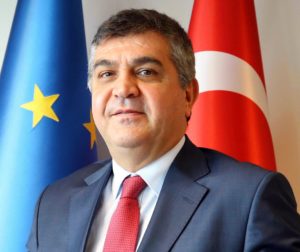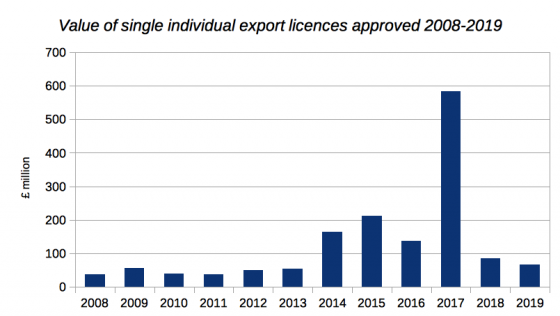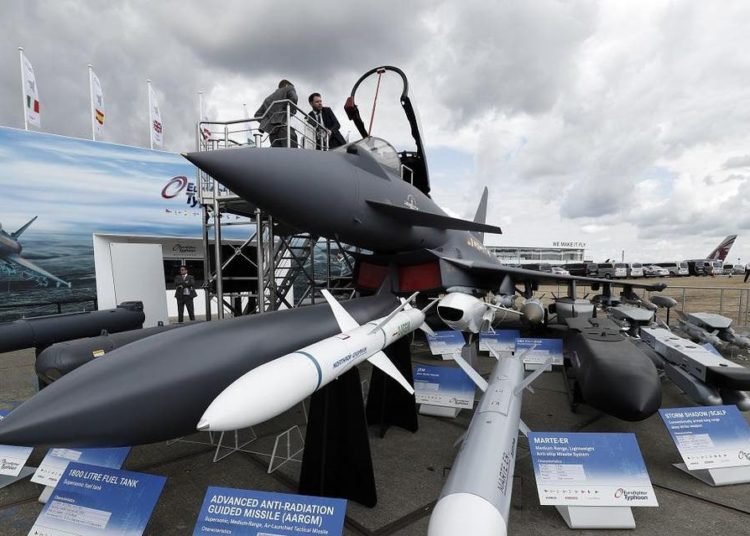Levent Kenez/Stockholm
Turkish Deputy Foreign Minister Faruk Kaymakcı stated at a meeting of the parliamentary Foreign Relations Committee on February 17 that the United Kingdom has lifted a ban on arms sales to Turkey that had been imposed along with European Union countries following a unilateral Turkish offensive in northern Syria in 2019, information that was kept secret from the public.
Explaining that Turkey faced obstacles in the procurement of weapons, Kaymakcı said this was also the case before the military operation in 2019 and that it was instrumental in Turkey strengthening its own defense industry.
Kaymakcı stated that they are trying to overcome barriers on arms sales and cited the United Kingdom’s removal of the arms sales ban as an example.

It was first claimed in early February that the United Kingdom had lifted the ban on arms sales to Turkey, but it was neither confirmed nor denied by the authorities. With Kaymakcı’s statement at the committee meeting, it was confirmed for the first time by a high-ranking diplomat that the ban had been lifted.
According to Britain’s Express daily, British Prime Minister Boris Johnson ordered the resumption of normal licensing in December.
The British government said licenses will only be issued if the applicant can “incontrovertibly demonstrate that the goods will not be used in northeastern Syria”; however, according the Express report, it is unclear how UK trade officials would be able to determine if the arms have been used in Syria or not.
According to Kaymakcı, significant progress was achieved in negotiations with the Netherlands and Germany on the issue. However, the Dutch government last October announced that the processing of license applications for the export of military goods or dual-use goods with military end-use to Turkey would resume provided that they are not used in northern Syria. Kaymakcı may have meant that they are working to get the bans lifted without any restrictions.
Without mentioning any names, Kaymakcı added that some Nordic countries have started to take a step back from the ban. Norway, Finland and Sweden all prohibit arms sales to Turkey. Sweden proposed more severe sanctions for Turkey in 2019. It later turned out that Swedish government records showed Sweden was not selling any actual weapons to the Turkish government at the time.
The part of the speech made by Deputy Foreign Minister Kaymakcı at the Turkish parliamentary committee meeting on arms sales bans:
Kaymakcı claimed that the reason for the change in attitude of the countries that imposed the ban was that they saw that the operation carried out by Turkey in northern Syria also prevented illegal and irregular migration.
EU leaders have been harshly criticized by human rights defenders who claim that they are turning a blind eye to human rights violations in exchange for Turkey’s efforts to keep refugees in its territory. Turkish President Recep Tayyip Erdoğan’s government prevents refugees from entering Europe in exchange for money from the EU, and from time to time Erdoğan creates artificial crises to increase his bargaining power.
On October 14, 2019, European Union countries agreed to limit arms exports to Turkey over its offensive in northern Syria, with the relevant ministers stating that they had agreed to “commit to strong national positions regarding their arms export policy to Turkey.” However, the EU avoided the legally binding embargo on Turkey demanded by the Netherlands and Sweden.
Turkey carried out four military operations in northern Syria between 2017 and 2019 and invaded some areas near the border. Turkey wanted to prevent the People’s Protection Units (YPG), a Kurdish militia group that Turkey claims is the Syrian branch of the outlawed Kurdistan Workers’ Party (PKK), from becoming a bigger threat to itself by getting stronger after the YPG achieved military success against the Islamic State in Iraq and Syria (ISIS, or Daesh).
According to information obtained by Nordic Monitor, military experts think it is not easy to determine whether weapons purchased from European countries are used in northern Syria. They also state that some military materials make up critical parts of strategic weapons.
For instance, Ceri Gibbons, an activist with Brighton Against the Arms Trade, revealed that British company EDO MBM, now a subsidiary of US company L3Harris, supplied bomb release mechanisms and associated technology that were used by Turkish arms company Baykar to produce Turkey’s first armed drone, the Bayraktar TB2.
According to figures announced by the Campaign Against Arms Trade (CAAT), a UK-based organization working to end the international arms trade, since a failed coup in Turkey in July 2016 and a crackdown on opposition groups, the UK approved permanent Single Individual Export Licences (SIELs) worth £806 million for arms exports to Turkey. A total of £1.3 billion in SIELs have been approved since the Gezi Park protests in May 2013.

In addition 114 Open Individual Export Licences (OIELs) were issued for exports to Turkey, allowing for unlimited deliveries of the equipment specified in the license. Turkey remains a priority market for the UK government’s arms export unit, according to CAAT.
Meanwhile, the UK and Turkey signed a free trade agreement on December 29, 2020, the first trade agreement between the UK and another state since the UK’s departure from the EU. Brexit has not affected the UK’s trade relations with Turkey thanks to the historic free trade agreements, Chris Gaunt, chairman of the British Chamber of Commerce in Turkey (BCCT), told the state-run Anadolu Agency.












